IGI Global
Reshaping graduate education through innovation& Experiential learning
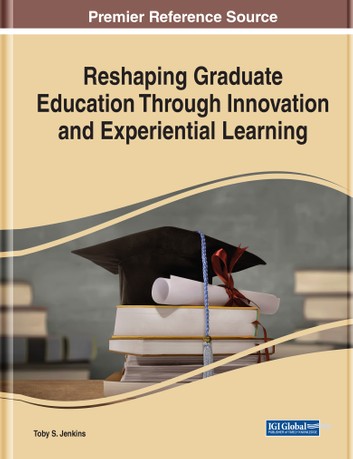
Discussions on the importance and impact of pedagogical practice on students as whole persons are often concentrated on the P-12 or undergraduate learning experience. In higher education, many institutions do an outstanding job of complicating the undergraduate classroom to include civic engagement, community-based learning, education abroad, social action, and project-based learning. But, what about the graduate classroom? While there are indeed numerous graduate programs that push students to interact with strong, meaningful, difficult, and sometimes harsh facts, scholarship, and ideologies, the instructional methods have largely remained stagnant. New methods of constructing deep and meaningful learning in graduate education is essential for the transformation and continued evolution of graduate school instruction. Reshaping Graduate Education Through Innovation and Experiential Learning is a crucial reference book that offers practice-based reflections on efforts to infuse creativity, social action, engaged learning, or other creative interventions into the graduate classroom. The book includes personal narratives that are grounded in pedagogical perspectives from graduate school instructors who share their experiences with innovative and transformative teaching practices. The goal of the book is to encourage graduate school professors to engage social justice education as something to be experienced and practiced in their courses and not just as a concept to be studied. As such, the book covers topics such as self-directed learning, counseling, and community mapping.
Rowman & Littlefield
Culture, community, & educational success:
re-imagining the invisible knapsack
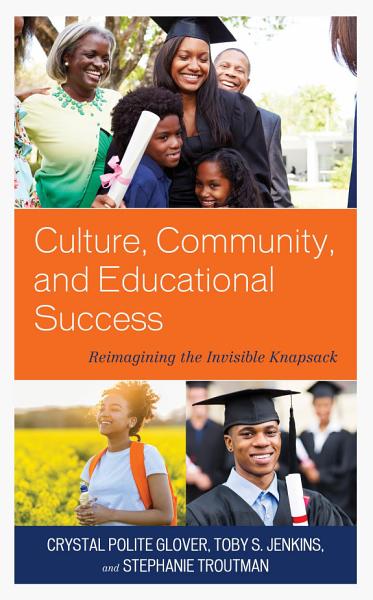
Many Black, Latinx, multiracial and ethnically diverse, first-generation college students turned PhDs—tie their academic success, achievements, and ability to navigate the difficult terrain of higher education back to the critical experiences and lessons learned in their home lives and through their cultural backgrounds. For them, culture matters. This book offers an opportunity for an anti-deficit and positive examination of (Black, Latinx, and multiracial) culture and its role in creating educational efficacy among academics of color. Through personal narrative, educational and learning theory, creative writing/poetry, this hybrid text examines the cultural path to the doctorate.
Transformative practice should be guided by an understanding of how an appreciation of a faculty member’s cultural, life, and social experiences can be used to establish a healthy environment that will better appreciate, engage, and retain faculty of color. Along these lines, this text also considers how cultural, life and social experiences translate into pedagogy, mentorship and value as faculty of color.
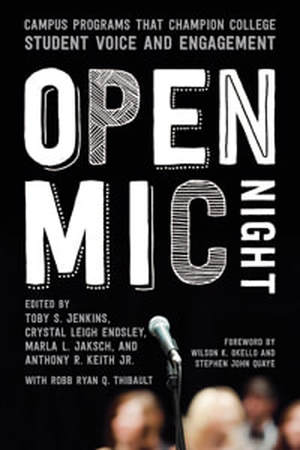
STYLUS PUBLISHING
THE OPEN MIC NIGHT:
CAMPUS PROGRAMS THAT CHAMPION COLLEGE STUDENT VOICE
While campuses across the United States have been offering spoken word programs for over 20 years, little attention has been paid to their purpose and impact beyond their contribution to the campus social aesthetic. There is an increasing understanding that performance poetry and spoken word is much more than entertainment. Within disciplines such as English, Ethnic, Women’s, and Cultural Studies, scholarship has identified spoken word’s role in developing political agency among young adults; its utility for promoting authentic youth voice; and its importance as a tool of cultural engagement. This book – compiled by scholar artists, including internationally recognized spoken word performers – offers guidance to student affairs professionals on using spoken word as a tool for college student engagement, activism, and civic awareness. Open mic nights offer college students a way to speak out, advocate, lead, educate, and explore with their peers.
Available on Amazon:
https://www.amazon.com/Open-Mic-Night-Programs-Engagement/dp/1620365138/ref=mt_paperback?_encoding=UTF8&me=
THE OPEN MIC NIGHT:
CAMPUS PROGRAMS THAT CHAMPION COLLEGE STUDENT VOICE
While campuses across the United States have been offering spoken word programs for over 20 years, little attention has been paid to their purpose and impact beyond their contribution to the campus social aesthetic. There is an increasing understanding that performance poetry and spoken word is much more than entertainment. Within disciplines such as English, Ethnic, Women’s, and Cultural Studies, scholarship has identified spoken word’s role in developing political agency among young adults; its utility for promoting authentic youth voice; and its importance as a tool of cultural engagement. This book – compiled by scholar artists, including internationally recognized spoken word performers – offers guidance to student affairs professionals on using spoken word as a tool for college student engagement, activism, and civic awareness. Open mic nights offer college students a way to speak out, advocate, lead, educate, and explore with their peers.
Available on Amazon:
https://www.amazon.com/Open-Mic-Night-Programs-Engagement/dp/1620365138/ref=mt_paperback?_encoding=UTF8&me=
Temple University Press
My Culture, My Color, My Self:
Heritage, Resilience, & Community in the Loves of Young Adults
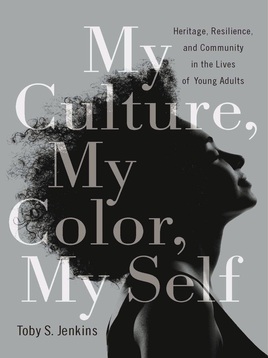
Understanding one’s cultural heritage and knowing one’s cultural community’s history helps motivate individuals to take agency and create change within their communities. But are today’s youth appreciative of their culture, or apathetic towards it? In her vibrant ethnography My Culture, My Color, My Self, Toby Jenkins provides engrossing, in-depth interviews and poignant snapshots of young adults talking about their lives and culture. She recounts D’Leon’s dream to become a positive example for African American men, and Francheska describing how her late mother inspired her appreciation of her Boricua heritage. In these and other portraits, Jenkins considers the role that cultural education and engagement plays in enhancing educational systems, neighborhood programs, and community structures. My Culture, My Color, My Self also features critical essays that focus on broader themes such as family bonds, education, and religion. Taken together, Jenkins shows how people of color use their culture as both a politic of social survival and a tool for social change.
Available at Amazon & Barnes & Nobles
Routledge Press
Family, Community, & Higher Education
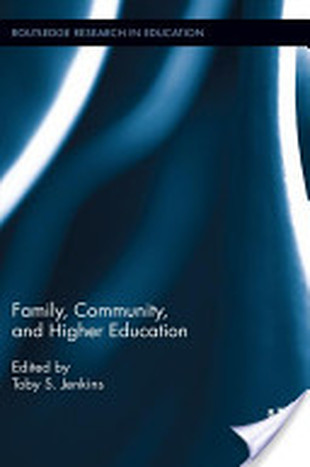
This book explores social topics and experiences that illustrate the various ways in which the family unit influences and impacts college students. In the text, the authors not only explore family memories, but also challenge the traditional lack of inclusion and appreciation for “family” as knowledge producers and educational allies. This book spotlights the family unit as a critical factor within the educational experience—one that prepares, supports, and sustains educational achievement through both everyday simple lessons and critical and difficult family challenges. Through these experiences, families teach the lessons of survival that often help students to persist in college.
Available at Amazon.com and Taylor & Francis websites:
http://www.amazon.com/Family-Community-Education-Routledge-Research/dp/0415502276/ref=sr_1_2?s=books&ie=UTF8&qid=1346780029&sr=1-2
http://www.taylorandfrancis.com/books/details/9780415502276/
Available at Amazon.com and Taylor & Francis websites:
http://www.amazon.com/Family-Community-Education-Routledge-Research/dp/0415502276/ref=sr_1_2?s=books&ie=UTF8&qid=1346780029&sr=1-2
http://www.taylorandfrancis.com/books/details/9780415502276/